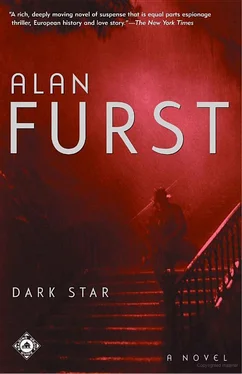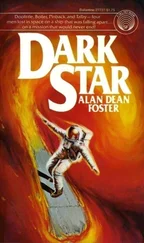Alan Furst - Dark Star
Здесь есть возможность читать онлайн «Alan Furst - Dark Star» весь текст электронной книги совершенно бесплатно (целиком полную версию без сокращений). В некоторых случаях можно слушать аудио, скачать через торрент в формате fb2 и присутствует краткое содержание. Жанр: Шпионский детектив, на английском языке. Описание произведения, (предисловие) а так же отзывы посетителей доступны на портале библиотеки ЛибКат.
- Название:Dark Star
- Автор:
- Жанр:
- Год:неизвестен
- ISBN:нет данных
- Рейтинг книги:3 / 5. Голосов: 1
-
Избранное:Добавить в избранное
- Отзывы:
-
Ваша оценка:
- 60
- 1
- 2
- 3
- 4
- 5
Dark Star: краткое содержание, описание и аннотация
Предлагаем к чтению аннотацию, описание, краткое содержание или предисловие (зависит от того, что написал сам автор книги «Dark Star»). Если вы не нашли необходимую информацию о книге — напишите в комментариях, мы постараемся отыскать её.
Dark Star — читать онлайн бесплатно полную книгу (весь текст) целиком
Ниже представлен текст книги, разбитый по страницам. Система сохранения места последней прочитанной страницы, позволяет с удобством читать онлайн бесплатно книгу «Dark Star», без необходимости каждый раз заново искать на чём Вы остановились. Поставьте закладку, и сможете в любой момент перейти на страницу, на которой закончили чтение.
Интервал:
Закладка:
So beautiful a bill, as well, but Szara paid it and tipped handsomely besides, for he knew the apparat could eventually find out anything, and he might have signed this man’s death warrant.
At dusk, Andre Szara sat in his unlit room with the remnants of a man’s life spread out around him.
There wasn’t a writer in the world who could resist attributing a melancholy romance to these artifacts, but, he argued to his critical self, that did not diminish their eloquence. For if the satchel itself spoke of Bokhara, Samarkand, or the oasis towns of the Kara Kum desert, its contents said something very different, about a European, a European Russian, who had traveled-served? hidden? died? — in those regions, about the sort of man he was, about pride itself.
The objects laid out on the hotel desk and bureau made up an estate. Some clothing, a few books, a revolver, and the humble tools-thread and needle, digestive tea, well-creased maps-of a man on the run. On the run, for there was equal clarity, equal eloquence, in the items not found. There were no photographs, no letters. No address book, no traveler’s journal. This had been a man who understood the people he fled from and protected the vulnerability of those who may have loved him.
The clothing had been packed on top, folded loosely but perfectly, as though by someone with a long history of military service, someone to whom the ordered neatness of a footlocker was second nature. It was good clothing, carefully preserved, often mended but terribly worn, its wear the result of repeated washings and long use in hard country. Cotton underdrawers and wool shirts, a thick sailor’s sweater darned at the elbows, heavy wool socks with virtually transparent heels.
The service revolver dated from prerevolutionary days, a Nagant, the double-action officer’s model, 7.62mm from a design of 1895. It was well oiled and fully loaded. From certain characteristics, Szara determined that the sidearm had had a long and very active life. The lanyard ring at the base of the grip had been removed and the surface filed flat, and the metal at the edges of the sharp angles, barrel opening, cylinder, the trigger itself, was silvery and smooth. A look down the barrel showed it to be immaculate, cleaned not with the usual brick dust-an almost religious (and thereby ruinous) obsession with the peasant infantry of the Great War-but with a scouring brush of British manufacture folded in a square of paper. Not newspaper, for that told of where you had been and when you were there. Plain paper. A careful man.
The books were also from the time before the revolution, the latest printing date 1915; and Szara handled them with reverence for they were no longer to be had. Dobrilov’s lovely essays on noble estates, Ivan Krug’s Poems at Harvest, Gletkhin’s tales of travel among the Khivani, Pushkin of course, and a collection by one Churnensky, Letters from a Distant Village, which Szara had never heard of. These were companions of journey, books to be read and read again, books for a man who lived in places where books could not be found. Eagerly, Szara paged through them, looking for commentary, for at least an underlined passage, but there was, as he’d expected, not a mark to be found.
Yet the most curious offering of the opened satchel was its odor. Szara could not really pin it down, though he held the sweater to his face and breathed in it. He could identify a hint of mildew, woodsmoke, the sweetish smell of pack animals, and something else, a spice perhaps, cloves or cardamom, that suggested the central Asian marketplace. It had been carried in the satchel for a long time, for its presence touched the books and the clothing and the leather itself. Why? Perhaps to make spoiled food more palatable, perhaps to add an ingredient of civilization to life in general. On this point he could make no decision.
Szara was sufficiently familiar with the practices of intelligence services to know that chronology meant everything. “May God protect and keep the czar” at the end of a letter meant one thing in 1916, quite another in 1918. With regard to the time of “the officer,” for Szara discovered himself using that term, the satchel’s contents offered an Austrian map of the southern borders of the Caspian Sea dated 1919. The cartography had certainly begun earlier (honorary Bolshevik names were missing), but the printing date allowed Szara to write on a piece of hotel stationery “alive in 1919.” Checking the baggage tag once again, he noted “tentative terminal date, 8 February 1935.” A curious date, following by two months and some days the assassination of Sergei Kirov at the Smolny Institute in St. Petersburg, 1 December 1934, which led to the first round of purges under Yagoda.
A terminal date? Yes, Szara thought, this man is dead.
He simply knew it. And, he felt, much earlier than 1935. Somehow, another hand had recovered the satchel and moved it to the left-luggage room of a remote Prague railway station that winter. Infinite permutations were of course possible, but Szara suspected that a life played out in the southern extremity of the Soviet empire had ended there. The Red Army had suppressed the pasha’s risings in 1923. If the officer, perhaps a military adviser to one of the local rulers, had survived those wars, he had not left the region. There was nothing of Europe that had not been packed on some night in, Szara guessed, 1920.
That the satchel itself had survived was a kind of miracle, though presently Szara came upon a rather more concrete possibility-the stitching on the bottom lining. This was not the same hand that had lovingly and expertly crafted the seams. The reattachment had been managed as best it could be done, with waxed thread sewn into a cruciform shape anchoring each corner. So, the officer carried more than books and clothes. Szara remembered what Renate Braun had said in the lobby of Khelidze’s hotel: “It is for you.” Not old maps, books, and clothing certainly, and not a Nagant pistol. What was now “his” lay beneath the satchel’s false bottom in a secret compartment.
Szara called the desk and had a bottle of vodka sent up. He sensed a long, difficult night ahead of him-the city of Prague was bad enough, the officer’s doomed attempt to survive history didn’t make things any better. He must, Szara reasoned, have been a loyal soldier in the czar’s service, thus fugitive after the revolution in 1917. Perhaps he’d fought alongside White Guardist elements in the civil war. Then flight, always southeast, into central Asia, as the Red Army advanced. The history of that place and time was as evil as any Szara knew-Basmatchi, the marauding bandits of the region, Baron Ungarn-Sternberg, a sadist and a madman, General Ma and his Muslim army; rape, murder, pillage, captives thrown into locomotive boilers to die in the steam. He suspected that this man, who carried a civilized little library and carefully darned the elbows of his sweater, had died in some unremembered minor skirmish during those years. There were times when a bullet was the best of all solutions. Szara found himself hoping it had been that way for the officer.
The vodka helped. Szara was humming a song by the time he had his razor out, sawing away at the thick bands of crisscrossed thread. The officer was no fool. Who, Szara wondered, did he think to deceive with this only too evident false bottom contrivance? Perhaps the very densest border patrolman or the most slow-witted customs guard. The NKVD workshops did this sort of thing quite well, leaving only the slimmest margin for secreting documents and disguising the false bottom so that you really could not tell. On the other hand, the officer had likely done what he could, used the only available hiding place and hoped for the best. Yes, Szara understood him now, better and better; the sewn-down corners revealed a sort of determination in the face of hopeless circumstances, a quality Szara admired above all others. Having cut loose the final corner, he had to use a nail file to pry up the leather flap.
Читать дальшеИнтервал:
Закладка:
Похожие книги на «Dark Star»
Представляем Вашему вниманию похожие книги на «Dark Star» списком для выбора. Мы отобрали схожую по названию и смыслу литературу в надежде предоставить читателям больше вариантов отыскать новые, интересные, ещё непрочитанные произведения.
Обсуждение, отзывы о книге «Dark Star» и просто собственные мнения читателей. Оставьте ваши комментарии, напишите, что Вы думаете о произведении, его смысле или главных героях. Укажите что конкретно понравилось, а что нет, и почему Вы так считаете.












